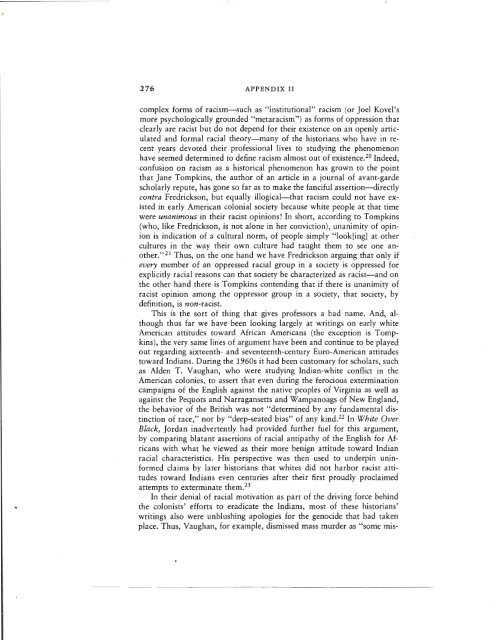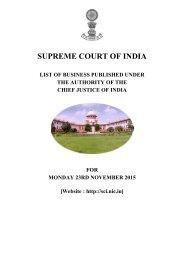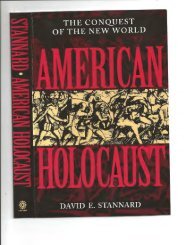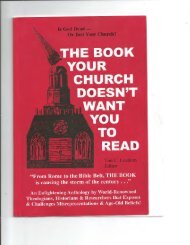- Page 2 and 3:
- . - ·-=-~~~~~--HISTORY"A much-ne
- Page 4 and 5:
AMERICANHOLOCAUSTThe Conquest of th
- Page 6 and 7:
For Florence Evelyn Harwood Stannar
- Page 8 and 9:
PROLOGUEIN THE DARKNESS of an early
- Page 10 and 11:
PROLOGUExiafter with an epigraph fr
- Page 12 and 13:
PROLOGUExiiiHistory for its own sak
- Page 14 and 15:
PROLOGUEXVamong indigenous peoples
- Page 16 and 17:
.... I ..BEFORE COLUMBUS
- Page 18 and 19:
4 AMERICAN HOLOCAUSTcapital already
- Page 20 and 21:
6 AMERICAN HOLOCAUSTwas ringed with
- Page 22 and 23:
8 AMERICAN HOLOCAUSTcustoms of the
- Page 24 and 25:
10 AMERICAN HOLOCAUSTsands of years
- Page 26 and 27:
12 AMERICAN HOLOCAUSTlatitude for t
- Page 28 and 29:
14 AMERICAN HOLOCAUSTof apartheid.
- Page 30 and 31:
2COMBINED, NORTH AMERICA and South
- Page 32 and 33:
BEFORE COLUMBUS 19that archaeologis
- Page 34 and 35:
BEFORE COLUMBUS21. But in fact the
- Page 36 and 37:
BEFORE COLUMBUSbounty nature had gi
- Page 38 and 39:
BEFORE COLUMBUS 25their extraordina
- Page 40 and 41:
BEFORE COLUMBUS 27cal and religious
- Page 42 and 43:
BEFORE COLUMBUS29legal device. And
- Page 44 and 45:
BEFORE COLUMBUSSimilar observations
- Page 46 and 47:
BEFORE ·COLUMBUSpassed the limits
- Page 48 and 49:
BEFORE COLUMBUSHworld away in each
- Page 50 and 51:
BEFORE COLUMBUS 37the most extraord
- Page 52 and 53:
BEFORE COLUMBUS39Their cosmology la
- Page 54 and 55:
BEFORE COLUMBUS 41most extensive em
- Page 56 and 57:
BEFORE COLUMBUSThere were no locks
- Page 58 and 59:
BEFORE COLUMBUSpie of the Andes bui
- Page 60 and 61:
BEFORE COLUMBUS 47impressed into ro
- Page 62 and 63:
BEFORE COLUMBUS 49further south on
- Page 64 and 65:
BEFORE COLUMBUS 51rine corrals held
- Page 66 and 67:
BEFORE COLUMBUSIndeed, Morgan later
- Page 68 and 69:
NATIVE PEOPLESFor 40,000 years, hun
- Page 70 and 71:
;.Temple Group at Uaxactun, Guatema
- Page 72 and 73:
The Gallery of the Mercado, Chichen
- Page 74 and 75:
"While hunting with some of my comr
- Page 76 and 77:
The town of Secotan in Virginia, wh
- Page 78 and 79:
A young Seri Indian woman of southw
- Page 80 and 81:
A family from an unknown (possibly
- Page 82 and 83:
A Nez Perce boy from the ColumbiaPl
- Page 84 and 85:
4"< .II·PESTILENCE AND GENOCIDE
- Page 86 and 87:
58 AMERICAN HOLOCAUSTsands who live
- Page 88 and 89:
60 AMERICAN HOLOCAUSTepisode of mas
- Page 90 and 91:
62 AMERICAN HOLOCAUSTthe Inquisitio
- Page 92 and 93:
64 AMERICAN HOLOCAUSTto know where
- Page 94 and 95:
66 AMERICAN HOLOCAUSTI certify to y
- Page 96 and 97:
68 AMERICAN HOLOCAUSTcapital, his t
- Page 98 and 99:
70 AMERICAN HOLOCAUSTthere, in a pl
- Page 100 and 101:
72 AMERICAN HOLOCAUST' 'proceeded t
- Page 102 and 103:
74 AMERICAN HOLOCAUSTthey were dism
- Page 104 and 105:
76 AMERICAN HOLOCAUSTdian allies-at
- Page 106 and 107:
78 AMERICAN HOLOCAUSTof the Aztec l
- Page 108 and 109:
80 AMERICAN HOLOCAUSTpeak of the Az
- Page 110 and 111:
82 AMERICAN HOLOCAUST95 percent. It
- Page 112 and 113:
84 AMERICAN HOLOCAUSTdian children
- Page 114 and 115:
86 AMERICAN HOLOCAUSTico, over a so
- Page 116 and 117:
88 AMERICAN HOLOCAUSTI would not co
- Page 118 and 119:
90 AMERICAN HOLOCAUSTish seemed to
- Page 120 and 121:
92 AMERICAN HOLOCAUSTtosf in the An
- Page 122 and 123:
94 AMERICAN HOLOCAUSTtation masters
- Page 124 and 125:
.4INTHE AREA around the town of Bar
- Page 126 and 127:
PESTILENCE AND GENOCIDE 99God to be
- Page 128 and 129:
PESTILENCE AND GENOCIDE 101in Londo
- Page 130 and 131:
PESTILENCE AND GENOCIDE 103other co
- Page 132 and 133:
PESTILENCE AND GENOCIDElOSfered by
- Page 134 and 135:
PESTILENCE AND GENOCIDE 107winter o
- Page 136 and 137:
PESTILENCE AND GENOCIDE 109that one
- Page 138 and 139:
PESTILENCE AND GENOCIDE 111to carry
- Page 140 and 141:
PESTILENCE AND GENOCIDE 113mystery,
- Page 142 and 143:
PESTILENCE AND GENOCIDE 115"little
- Page 144 and 145:
PESTILENCE AND GENOCIDE 117menting"
- Page 146 and 147:
PESTILENCE AND GENOCIDE 119atrocity
- Page 148 and 149:
PESTILENCE AND GENOCIDE 121lowed up
- Page 150 and 151:
PESTiLENCE AND GENOCIDE 123de Tocqu
- Page 152 and 153:
PESTILENCE AND GENOCIDE 125had redu
- Page 154 and 155:
PESTILENCE AND GENOCIDE 127were fir
- Page 156 and 157:
PESTILENCE AND GENOCIDE 129away as
- Page 158 and 159:
PESTILENCE AND GENOCIDE 131This, th
- Page 160 and 161:
PESTILENCE AND GENOCIDE 133take up
- Page 162 and 163:
PESTILENCE AND GENOCIDEHSsailed up
- Page 164 and 165:
PESTILENCE AND GENOCIDE 137the padr
- Page 166 and 167:
PESTILENCE AND GENOCIDE 139food pro
- Page 168 and 169:
PESTILENCE AND GENOCIDE 141answered
- Page 170 and 171:
PESTILENCE AND GENOCIDE 143varied "
- Page 172 and 173:
PESTILENCE AND GENOCIDE 145the [Ind
- Page 174 and 175:
GENOCIDEDuring the course of four c
- Page 176 and 177:
"As the Spaniards went with their w
- Page 178 and 179:
"The Spanish treated the Indians wi
- Page 180 and 181:
"Because he did not give the great
- Page 182 and 183:
"With my own eyes I saw Spaniards c
- Page 184 and 185:
"In one square of less than half an
- Page 186 and 187:
Mass burials followed the carnage.
- Page 188 and 189:
In the wake of the carnage, whites
- Page 190 and 191:
IIISEX, RACE, AND HOLY WAR
- Page 192 and 193:
ISOAMERICAN HOJ.,OCAUSTfueled genoc
- Page 194 and 195:
1S2AMERICAN HOLOCAUSTfrom the other
- Page 196 and 197:
154 AMERICAN HOLOCAUSTto the high M
- Page 198 and 199:
156 AMERICAN HOLOCAUSTOf course, su
- Page 200 and 201:
HSAMERICAN HOLOCAUSTgons of the fai
- Page 202 and 203:
160 AMERICAN HOLOCAUSTstones, whipp
- Page 204 and 205:
162 AMERICAN HOLOCAUSTrevealing fas
- Page 206 and 207:
164 AMERICAN HOLOCAUST. And neverth
- Page 208 and 209:
166 AMERICAN HOLOCAUSTthere followe
- Page 210 and 211:
168 AMERICAN HOLOCAUSTfurther remov
- Page 212 and 213:
170 AMERICAN HOLOCAUSTdwelling, and
- Page 214 and 215:
172 AMERICAN HOLOCAUSTwithin even t
- Page 216 and 217:
174 AMERICAN HOLOCAUSTFrom this per
- Page 218 and 219:
176 AMERICAN HOLOCAUSTtected the re
- Page 220 and 221:
178 AMERICAN HOLOCAUSToverhead in A
- Page 222 and 223:
180 AMERICAN HOLOCAUSTIf not wiped
- Page 224 and 225:
182 AMERICAN HOLOCAUSTeconomy. But
- Page 226 and 227:
184 AMERICAN HOLOCAUSTficial, conte
- Page 228 and 229:
186 AMERICAN HOLOCAUSTleashed-and t
- Page 230 and 231:
188 AMERICAN HOLOCAUSTtion criticis
- Page 232 and 233:
190 AMERICAN HOLOCAUSTfor what happ
- Page 234 and 235:
192 AMERICAN HOLOCAUSTknown. And, a
- Page 236 and 237:
CHRISTOPHER COLUMBUS VIEWED himself
- Page 238 and 239:
SEX, RACE AND HOLY WAR 197disciplin
- Page 240 and 241:
SEX, RACE AND HOLY WAR 199informati
- Page 242 and 243:
SEX, RACE AND HOLY WAR 201religion.
- Page 244 and 245:
SEX, RACE AND HOLY WAR 203tainly sp
- Page 246 and 247:
SEX, RACE AND HOLY WAR 205not need
- Page 248 and 249:
SEX, RACE AND HOLY WAR 207appearanc
- Page 250 and 251:
SEX, RACE AND HOLY WAR 209In ancien
- Page 252 and 253:
SEX, RACE AND HOLY WAR 211contended
- Page 254 and 255:
SEX, RACE AND HOLY WAR 213tive raci
- Page 256 and 257:
SEX, RACE AND HOLY WAR 215the littl
- Page 258 and 259:
SEX, RACE AND HOLY WAR 217century F
- Page 260 and 261:
SEX, RACE AND HOLY WAR 219pean epid
- Page 262 and 263:
SEX, RACE AND HOLY WAR 221neither d
- Page 264 and 265:
SEX, RACE AND HOLY WAR 223ing the i
- Page 266 and 267: SEX, RACE AND HOLY WAR 225regated e
- Page 268 and 269: SEX, RACE AND HOLY WAR 227in the Gr
- Page 270 and 271: SEX, RACE AND HOLY WAR 229beings an
- Page 272 and 273: SEX, RACE AND HOLY WAR 231serves Sl
- Page 274 and 275: SEX, RACE AND HOLY WAR2Hthe British
- Page 276 and 277: SEX, RACE AND HOLY WAR 235uum domic
- Page 278 and 279: SEX, RACE AND HOLY WAR 237indenture
- Page 280 and 281: SEX, RACE AND HOLY WAR 239fronted b
- Page 282 and 283: SEX, RACE AND HOLY WAR 241beasts wh
- Page 284 and 285: SEX, RACE AND HOLY WAR 243inner pro
- Page 286 and 287: SEX, RACE AND HOLY WAR 245Two decad
- Page 288 and 289: EPILOGUEIt is unlikely to have esca
- Page 290 and 291: EPILOGUE 249still were human-and it
- Page 292 and 293: EPILOGUE2Slunaware of the racism on
- Page 294 and 295: EPILOGUE 253using screwdrivers to k
- Page 296 and 297: EPILOGUE 255Indeed, it is insuffici
- Page 298 and 299: EPILOGUE 257Ridge in South Dakota a
- Page 300 and 301: APPENDIXES
- Page 302 and 303: 262 APPENDIX ISkeptics remained unc
- Page 304 and 305: 264 APPENDIX Ipassable by foot even
- Page 306 and 307: 266 APPENDIX Ihad to carry out at l
- Page 308 and 309: 268 APPENDIX Ibest estimate for the
- Page 310 and 311: 270 APPENDIX IIing her infant throw
- Page 312 and 313: 272 APPENDIX IIanimality and a pecu
- Page 314 and 315: 274 APPENDIX IIfirst of these is hi
- Page 318 and 319: 278 APPENDIX IIearly years of settl
- Page 320 and 321: 280 APPENDIX IIUNITED NATIONS CONVE
- Page 322 and 323: ACKNOWLEDGMENTSDuring the course of
- Page 324 and 325: NOTESPrologue1. The official Americ
- Page 326 and 327: NOTES 287involvement in and support
- Page 328 and 329: NOTES 28923. Francis Jennings, The
- Page 330 and 331: NOTES 291Longacre, ed., Reconstruct
- Page 332 and 333: NOTES 29344. Robert Silverberg, Mou
- Page 334 and 335: NOTES 29571. For this and more see
- Page 336 and 337: NOTES 297Gerald R. Clark, "A Late P
- Page 338 and 339: NOTES 299in Western Europe from Lat
- Page 340 and 341: NOTES 301in a symposium on that boo
- Page 342 and 343: NOTES 303Bureau of Labor Statistics
- Page 344 and 345: NOTES 305121. Ibid., p. 143. See al
- Page 346 and 347: NOTES 307Principal Navigations, Voy
- Page 348 and 349: NOTES 309one-third; see William H.
- Page 350 and 351: NOTESHl81. Leach, Flintlock and Tom
- Page 352 and 353: NOTESH3Western Oregon," Ethnohistor
- Page 354 and 355: NOTES 315145. Cook, Indian versus t
- Page 356 and 357: NOTES 317people killed in the Holoc
- Page 358 and 359: NOTES 319bridge: Cambridge Universi
- Page 360 and 361: NOTES ~2146. Quoted in Couliano, Er
- Page 362 and 363: NOTES 323bridge University Press, 1
- Page 364 and 365: NOTES32SMediterranean and the Medit
- Page 366 and 367:
NOTES 32725. Robert L. O'Connell, O
- Page 368 and 369:
NOTES 32960. Quoted in Todorov, Con
- Page 370 and 371:
NOTES 331White Man to Redskin: Chan
- Page 372 and 373:
NOTESH3113. See Schlatter, Private
- Page 374 and 375:
NOTES~eal E. Salisbury, "Red Purita
- Page 376 and 377:
NOTES 337The toll in Soviet militar
- Page 378 and 379:
NOTES 339cide in New Mexico, 1957-1
- Page 380 and 381:
INDEXAbenaki Indians, 118Acaxee peo
- Page 382 and 383:
INDEX 349Chaco Canyon, 25Chadwick,
- Page 384 and 385:
INDEX 351Golovnin, V.M., 138Gomara,
- Page 386 and 387:
INDEXLifton, Robert Jay, 246Lillooc
- Page 388 and 389:
INDEXH5Pennacook Indians, 28Penning
- Page 390 and 391:
INDEX 357Thirty Years War, 225Thoma





